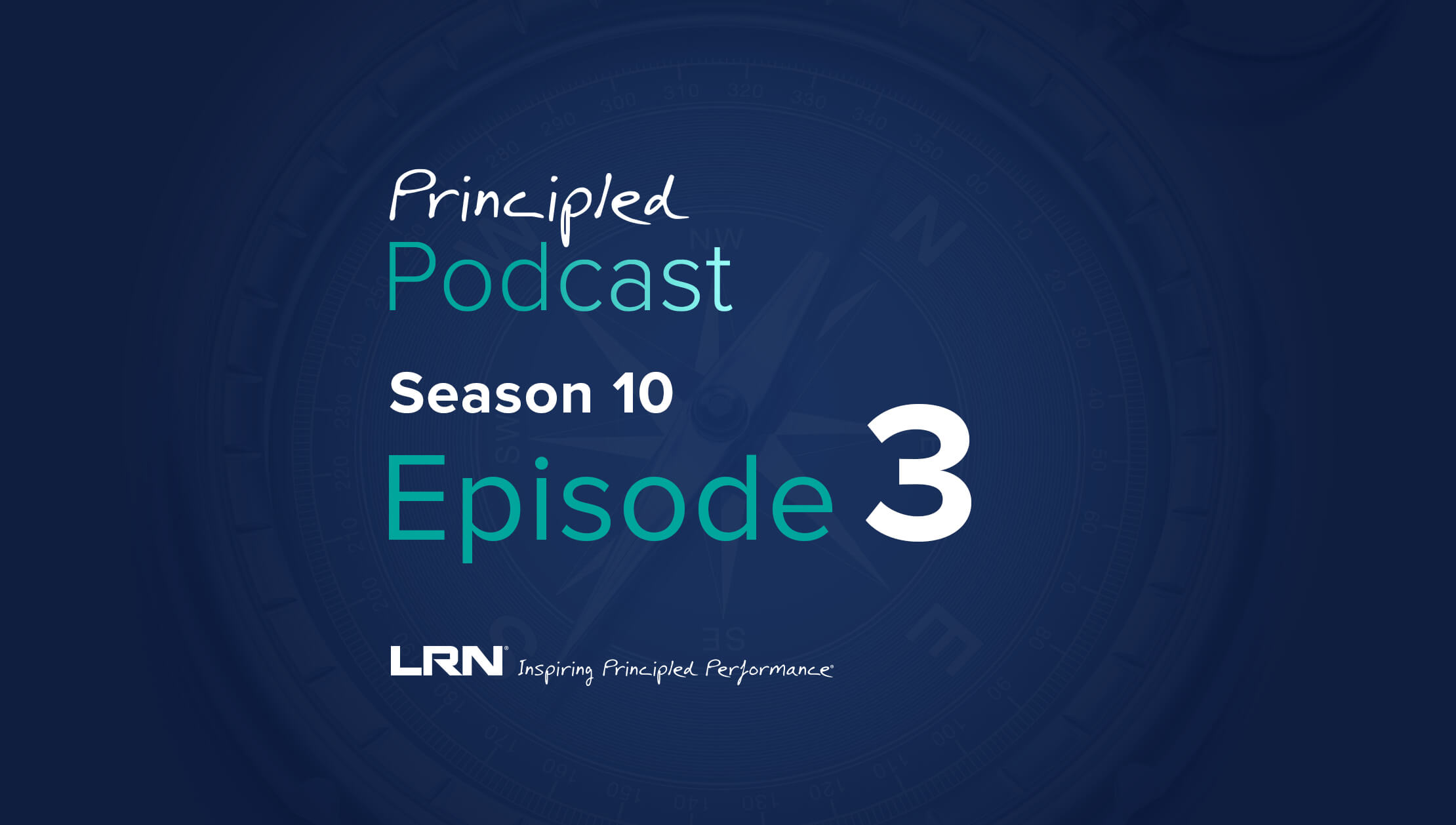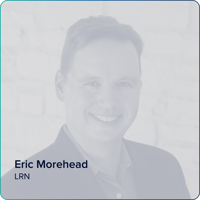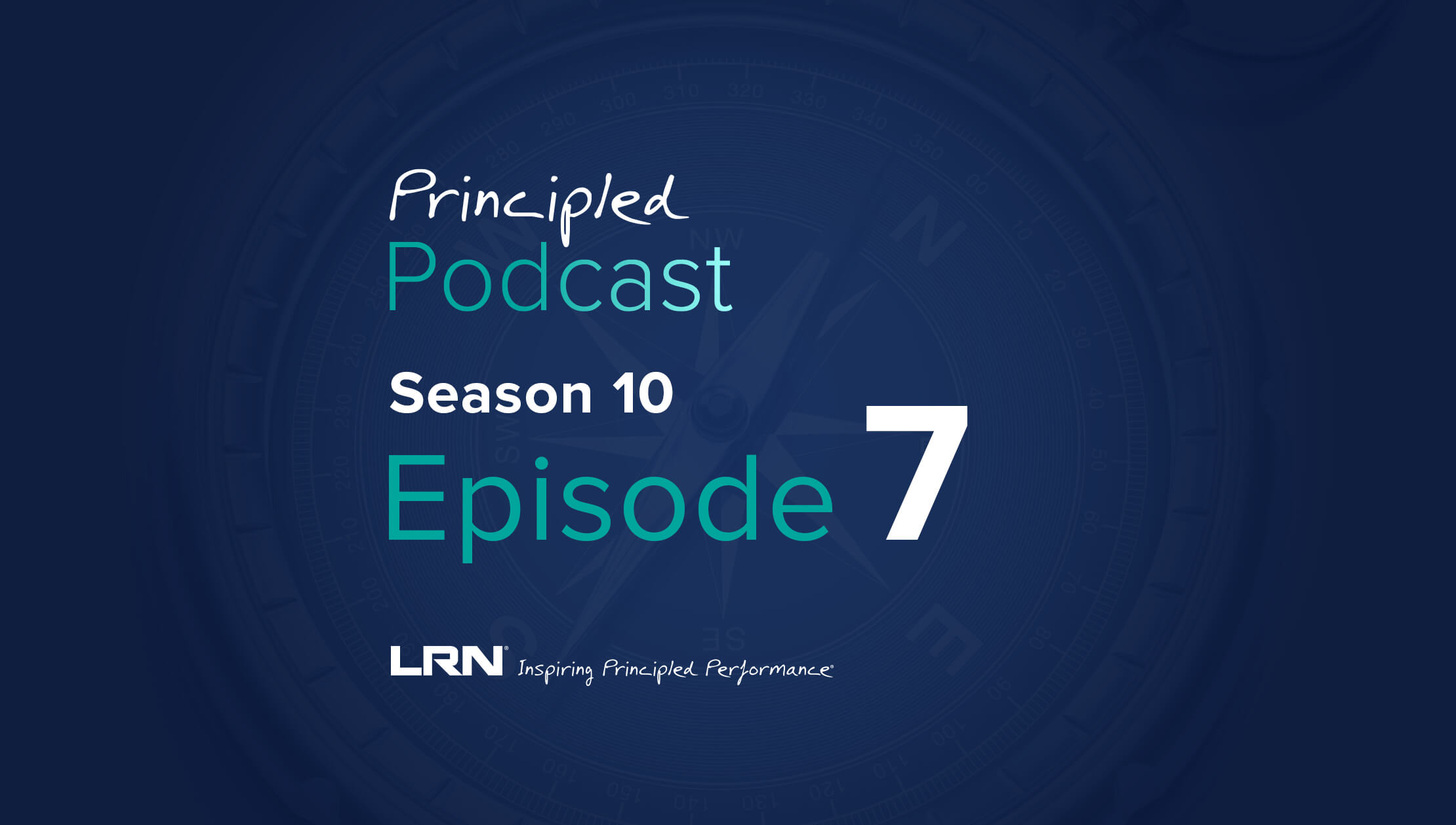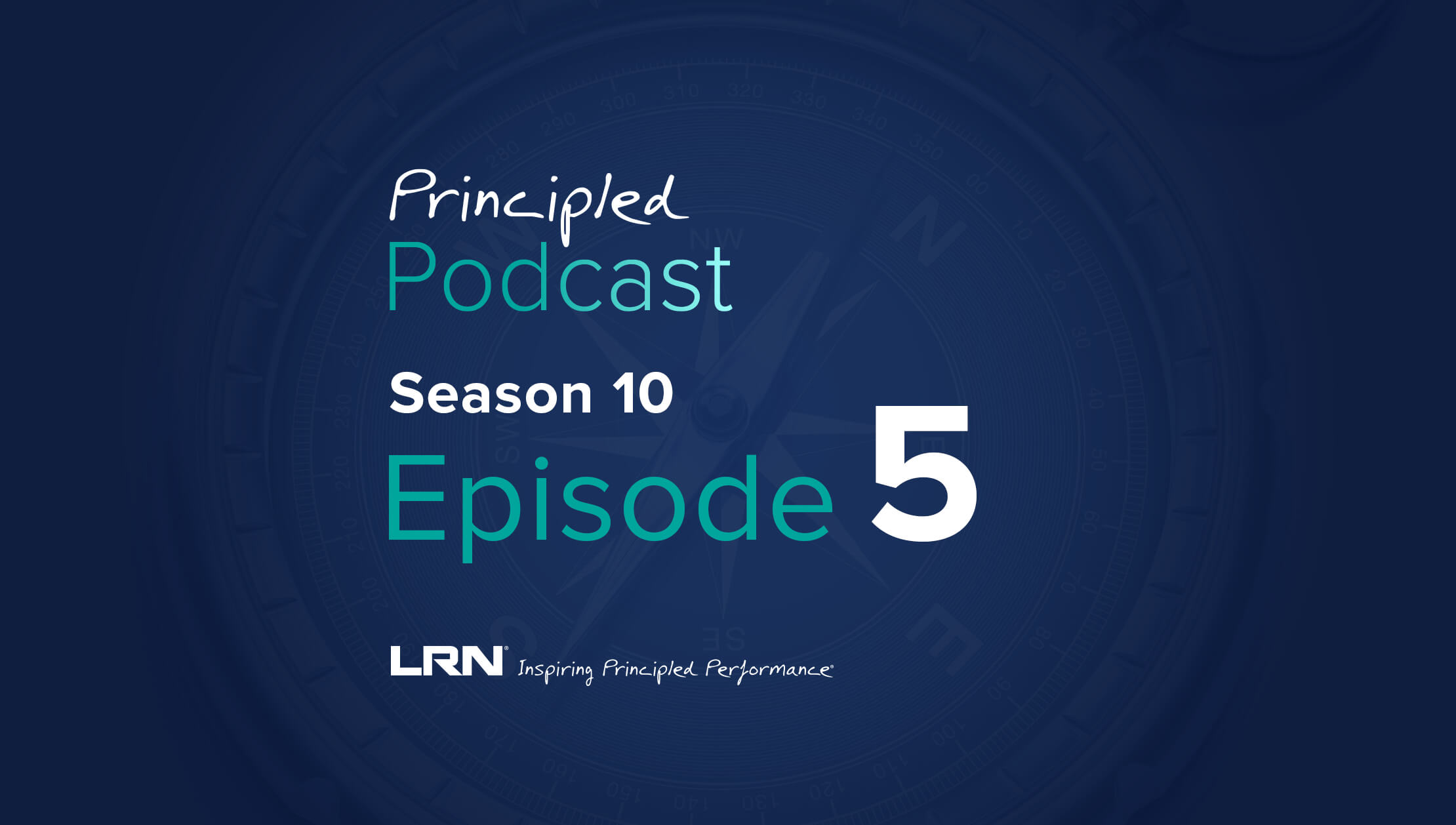What you'll learn on this podcast episode
Environmental, social, and governance, or ESG, has been in the news a lot lately—particularly the “E” when it comes to new and evolving regulations. There’s been a greater push in the United States for transparency and disclosure of data regarding businesses’ environmental impact, driven largely by the Securities and Exchange Commission and the National Advertising Division of the Better Business Bureau. In fact, California is expected to soon be the first US state to require company reporting related to environmental impact. So, what does this all mean for companies that are working to become more sustainable? How do you even begin to report on emissions and environmental impact? In this episode of LRN’s Principled Podcast host Eric Morehead explores how transparency plays a crucial role in corporate sustainability with Andrea Peters, the senior counsel of Interface.
Where to stream
Be sure to subscribe to the Principled Podcast wherever you get your podcasts.
Guest: Andrea Peters
Andrea Peters is senior counsel for Interface, Inc., a global commercial flooring company (NASDAQ: TILE). In her role, she provides legal support for the company’s global operations, including Research & Development, Sales, Marketing, Procurement, Tax and Human Resources, and she also manages Interface’s global compliance program. Andrea has over 26 years of legal experience, over two-thirds of which comes from working in-house at companies such as Interface, CAN Capital, The Weather Channel, the General Electric Company and GAMBRO Healthcare.
Andrea earned her J.D. from the Vanderbilt University School of Law and her Bachelor of Arts degree in Advertising from the Pennsylvania State University, where she was the student marshall (valedictorian) for the College of Communications.
Andrea resides in Atlanta with her 10-year-old daughter. She has gone sky diving twice, bungee jumping once, and ziplining once. She enjoys cooking, wine and travel. When she retires, Andrea plans to go back to college to audit all of the hard but interesting classes without worrying about writing papers or taking exams.
Host: Eric Morehead
Eric Morehead is a member of LRN’s Advisory Services team and has over 20 years of experience working with organizations seeking to address compliance issues and build effective compliance and ethics programs. Eric conducts program assessments and examines specific compliance risks, he drafts compliance policies and codes of conduct, works with organizations to build and improve their compliance processes and tools, and provides live training for Boards of Directors, executives, managers, and employees.
Eric ran his own consultancy for six years where he advised clients on compliance program enhancements and assisted in creating effective compliance solutions.
Eric was formally the Head of Advisory Services for NYSE Governance Services, a leading compliance training organization, where he was responsible for all aspects of NYSE Governance Services’ compliance consulting arm.
Prior to joining NYSE, Eric was an Assistant General Counsel of the United States Sentencing Commission in Washington, DC. Eric served as the chair of the policy team that amended the Organizational Sentencing Guidelines in 2010.
Eric also spent nearly a decade as a litigation attorney in Houston, Texas where he focused on white-collar and regulatory cases and represented clients at trial and before various agencies including SEC, OSHA and CFTC.
Principled Podcast transcription
Intro: Welcome to the Principled Podcast brought to you by LRN. The Principled Podcast brings together the collective wisdom on ethics, business and compliance, transformative stories of leadership, and inspiring workplace culture. Listen in to discover valuable strategies from our community of business leaders and workplace change makers.
Eric Morehead: Environmental, social and governance, or ESG has been in the news a lot lately, particularly the E when it comes to new and evolving regulation. There's been a greater push here in the United States for transparency and disclosure of environmental claims, driven largely by the Security and Exchange Commission and the National Advertising Division of the Better Business Bureau. But what does that mean for companies that are working to become more sustainable? And how do you even begin to report on emissions environmental impact?
Hello, and welcome to another episode of LRN's Principal Podcast. I'm your host, Eric Morehead, director of Advisory Services Solutions at LRN. Today I'm joined by Andrea Peters, the senior counsel of the global flooring company Interface. We're going to be talking about that E of ESG, and how transparency plays a crucial role in corporate sustainability. Andrea brings more than a decade of expertise to the space, having served as legal counsel for organizations in financial services, media and manufacturing.
Andrea, thanks for coming on the Principled Podcast.
Andrea Peters: Thanks, Eric. I'm excited to be here.
Eric Morehead: So let's jump right in. To get started, can you tell us a little bit about Interface and your role there as senior counsel?
Andrea Peters: Sure. I love to talk about Interface. We are a global flooring company specializing in carbon-neutral carpet tile, resilient flooring, and luxury vinyl tile, vinyl sheet, and nora brand rubber flooring. All of our flooring products are either carbon-neutral or carbon-negative. As senior counsel, I wear a lot of different hats to support the organization, including managing our global compliance program; managing our global intellectual property portfolio; supporting the human resources team on legal issues related to labor and employment in the Americas; providing legal support as needed to our tax team; providing legal assistance, including review and drafting for certain of our larger contracts; and managing and supporting our internal contracts administration team.
Eric Morehead: Those are definitely a lot of different hats, but we probably would spend the entire podcast talking about all your different responsibilities.
I want to focus on the overlap, if you will, between your counsel role in the general council and the ethics compliance role. Can you talk a little bit about how those overlap and what your approach is to handling those two distinct responsibilities?
Andrea Peters: Well, usually the role of an in-house counsel involves managing legal risk and providing legal services that support business growth. On a day-to-day basis that includes reviewing contracts, interpreting the law, managing disputes and litigation, managing employment law matters, and providing legal advice on areas like privacy law. By contrast, although not much contrast, compliance is the process of complying with the law with legal and regulatory requirements. Compliance is the process of complying with legal and regulatory requirements, industry standards, and community expectations. In other words, compliance involves more than interpreting the law. It involves the development of business practices that are consistent with the purpose of those laws and the expectations of the community.
But there's a lot of overlap there. So since both functions are concerned with not only doing what's legally required, but also what's ethically appropriate and consistent with our company values, my approach doesn't change much across these functions. On the legal side, it's about helping to ensure that we're doing business the right way. Again, legally, ethically, and consistent with our values. And I guess on the compliance side, it's about helping to ensure that everyone at the company understands what that means and how they can be a part of it.
Eric Morehead: Yeah, they're very complimentary roles for sure.
One of the things, when you were talking about Interface as an organization, you really stress the fact that sustainability is integral to the products, talking about carbon-neutral products and the like. And I understand that Interface has really focused on sustainability for quite a while, since 1994, so that's long before the rest of us were probably talking about ESG, or certainly long before the world's been talking about it over the last year or 18 months. Can you walk us through Interface's journey to become more environmentally responsible and some of those key steps along the way?
Andrea Peters: Absolutely. Our journey began with our founder, Ray Anderson, who was getting questions from customers about what we were doing for the environment. And at the time we didn't have a good answer beyond complying with the law. A book landed on his desk called The Ecology of Commerce by Paul Hawken. And Ray Anderson described reading that book as a spear in the chest moment. It's when he convicted himself as a plunderer. He had never worried before about where our raw materials came from, just that they kept coming. So in 1994, Ray set our company on Mission Zero, our promise to eliminate any negative impact we have on the company by the year 2020. We started with things like low hanging fruit like waste, and moved into more complex things like assessing the carbon footprint of our operations and products.
In 2016, we knew we had a path to zero, and Interface is not the type of company to rest on our laurels, so we decided to think about what was next for us. That process led us to the intersection of what the world needed most now and what Interface was uniquely positioned to provide the world. And that is the reversal of global warming, or what we call Climate Takeback. The most exciting thing about this mission is that unlike Mission Zero, we need to use our power of influence, both inside and outside of Interface, to make this level of ambition a reality. At Interface, we're on a journey to become the most sustainable company in the world.
Eric Morehead: Ambition is, I think, key to that vision, and having that buy-in from the very top of the organization and setting the goals is really important, but you don't get there without a lot of people rowing in the same direction.
So when we look at your responsibilities specifically as senior counsel, can you talk to us a little bit about how specifically you are helping with those goals with the ESG responsibilities, especially in the E area and sustainability and environmental. How does the senior counsel role support that mission?
Andrea Peters: Well, luckily at Interface, sustainability is so important to our company and our mission. Unlike a lot of other companies, where they just take the E or the whole of ESG and give it to a department such as legal or compliance, at Interface, we have a full-time director of ESG. And that person is responsible for overseeing Interface's ESG reporting and our communication strategy for key stakeholders, particularly investors. That includes managing our annual ESG report, coordinating with third party ESG ratings agencies, and collaborating with internal subject matter experts on other external issues like the Climate Disclosure Project and the UN Global Compact, of which Interface is a member. It also includes coordination of future regulatory reporting requirements, like the SEC Climate Disclosures and the European CSRD.
Eric Morehead: I was just going to add to that. It's reinforcing the idea here that this is not something that just comes from the top of the organization or is aspirational, but it requires a lot of individual effort by a lot of different people in the organization to reach those goals.
Andrea Peters: That's for sure. I mean, I was, earlier this week, working with an internal working group on our annual ESG report, and we had people in the document from legal and compliance, from research and development, from our sustainability team, from our communications team, from our science and technology team. It is for sure a cross-functional effort.
Eric Morehead: That's really valuable for our audience.
You and I had talked about before in preparing for our discussion today, that I think a lot of ENC professionals feel alone, very alone in their responsibilities for ESG, because it's kind of been dropped on them. But I think a key message here is don't feel alone. Reach out to comms, reach out to other operational parts of the organization to get some assistance. Because you can't do it alone.
Andrea Peters: For sure. And I think one other important thing in this brave new world of ESG is making sure that everyone at the organization has a common understanding of what we mean when we say environmental, when we say social, when we say governance. Back in the early part of this century, eBay had a holiday commercial. And they showed different people unwrapping different holiday gifts, and it was either a small necklace or a big car, but it was always in the shape of the word "it". And the tagline was something like, whatever it is this holiday season, you can find it on eBay. And I often use that story to explain that "it" can mean a bunch of different things for a bunch of different people. And in order to make good forward progress on a matter as important as ESG, everyone has to be aligned about what it is that we're trying to do.
Eric Morehead: Absolutely. No, I think that's an important message for a lot of our audience to get, because I know a lot of people are struggling with how to tackle these responsibilities, and it's a team effort for sure.
It also leads us to our next area, which is external expectations. And in particular, we've seen a push, we've already mentioned the SEC a couple of times in the discussion here, but we've seen a push from SEC and also the National Advertising Division of the Better Business Bureau on putting together some standards. Can you break down for our audience a little bit about what they're looking for? I mean, I know some of the rules are not completely finished yet, but what direction does it look like regulatory bodies and standards bodies are looking for?
Andrea Peters: Boy, is this a hot area for regulatory agencies. So in March of 2022, the US Securities and Exchange Commission propose new rules that would require public companies to disclose climate related risks and greenhouse gas emissions in their financial statements. The proposed rules would require companies to disclose information about governance and about risk management processes for climate related risks, and how these risks have affected or are likely to affect their business, strategy, and outlook, and the impact of climate related events and transition activities on their financial statements. If the rules are adopted, companies would also be required to disclose their direct and indirect greenhouse gas emissions, upstream and downstream emissions in their value chain, if material. The proposed rules would apply to all public companies and have a phase in period for compliance.
So what does that mean? Eric, as you know, there are basically three types of emissions Scope. One are the emissions at the factory, that's the smoke coming out of the pipe, or what comes from burning natural gas on site. Scope two emissions are emissions from energy, where the emissions don't happen on site, like the smokestack at the electricity provider would be a Scope two emission. Scope three emissions, and that's where the crux of this really is, is everything else. It's emissions from the generation of raw materials, emissions related to vendors of other services like your bank, emissions from transporting materials and products, emissions generated at end of product life, and even emissions from employees commuting to and from work and going on business travel. So it includes emissions up and down the company's values chain, including heat trapping gases emitted by the supply chain. So reporting on Scope three emissions would be a big, big deal, I think, and require a lot of work by a lot of companies. And the final rule on that is expected to be published later this year.
Eric Morehead: Yeah, it sounds like it's going to be difficult no matter what. But if the Scope three is part of it, it could be something else for organizations to try to keep track of. Particularly since I think generally speaking there's still, and I'm kind of curious about your perspective about this; I feel like there's still a lot of immaturity on looking at third parties beyond anti-corruption. Because that's been a hot button issue for well over almost two decades now. But beyond that, we're going to be asking even more questions, and I don't know how prepared organizations are to get that information from their suppliers and vendors.
Andrea Peters: Well, I'm happy to tell you that Interface is prepared. We've been reporting on our Scope three emissions for some time, but I think that we are unusual in that regard. With the Uyghur Forced Labor Prevention Act, I think companies are starting to take a look at their supply chain and certainly the ones that are getting ready for compliance with the SEC proposed rule are starting to take a look, but it's going to be time-consuming and it's going to be expensive for the companies that haven't engaged in this kind of review before.
Eric Morehead: But to be fair, you guys have been thinking about this since 1994, so you've got a little bit of a head start on probably some of our comrades out there. But still, you're right, it's all doable, but it's a lot of work.
Andrea Peters: Agreed.
Eric Morehead: And that leads me to the other question, which is something that compliance officers are definitely used to hearing about over the past few years, and that's data. How do you show effectiveness of your initiatives? What kind of data can you get and what can you collect that is going to be helpful on reporting on your environmental progress here? What have you found or what has Interface isolated as some important strands of data here?
Andrea Peters: At Interface, we've been collecting environmental data since we began our journey in 1994. At the time, there were no canned software programs to facilitate it, so we developed our own system that we call Ecometrics. At the time, we wanted to capture data that isn't found in standard business and financial metrics, things like recycled and bio-based content, renewable energy, number of emission stacks, water intensity, and carbon footprints. So we have good experience at managing environmental data. Today though, there are many platforms for collecting and reporting on environmental data. Companies need to join these efforts at disclosure of environmental impacts like ESG reports and environmental product declarations or EPDs, and these disclosures need to be done to international standards and be third-party verified in order to really be accurate and trustable. So transparency, shining a light on environmental data, we believe leads to improvement, reduced environmental impact, and a positive impact on people's lives and the planet.
Eric Morehead: Yeah. Again, it all kind of ties back to the goals you were talking about earlier, going back for your organization at least for 20 years and proving that up. So you've got your goals, but then you've got to prove it up.
And that leads me back to ask a follow-up question. We mentioned the National Advertising Division of the Better Business Bureau. They have weighed in with some thoughts and some guidance on organizations making claims in their advertising about zero emissions and their emission profile generally. What's going on there and what should organizations be aware of when we're talking about advertising?
Andrea Peters: That was kind of a big one, and honestly, I'm not sure how many people are aware of it. But the National Advertising Division is the self-regulating advertising review board of the Better Business Bureau. And earlier this year, the NAD, as they're known, recommended that a company, JBS, discontinue certain claims, including certain claims appearing in its annual and sustainability report. These were claims where JBS said that they're committing to be net-zero by 2040, which we're hearing a lot from companies in their marketing materials. Well, the NAD determined that JBS' net-zero claims reasonably create consumer expectations that its efforts are providing environmental benefits, specifically net-zero carbon emissions by a specified date, which they said is a measurable outcome. So the NAD recognized that the record provided evidence of significant preliminary investment by JBS towards reducing their emissions by 2040. But they also found that the evidence doesn't support the message conveyed by the claim that they have a plan that they're implementing today to achieve net-zero operational impact. JBS appealed that decision. They lost that appeal in June of this year, requiring them to pull the offending claims.
But what's really unique about this decision, Eric, is that it was based on claims in a publicly filed government document, not a marketing document per se. So although the NAD had previously reviewed company data and statements and annual reports in prior cases to determine whether an advertiser's claims outside those reports were substantiated, this one, this case appears to be the first time that the NAD has indicated that claims made within corporate annual reports are considered advertising. So it seems to be an expansion of the NAD scope of review to in claims made in not only corporate annual reports, but ESG reports.
Eric Morehead: Yes. Yeah, I was going to mention that because that's where we're seeing a lot of these aspirational claims, is in sustainability reporting. And sustainability reporting is arguably the most mature aspect of this arena out there. There are so many companies that have been now on their, maybe almost a decade, of providing sustainability reporting. And so they have to be mindful I guess, at least mindful, if not very mindful of the claims that are being made in there, because they're going to be taken as advertising, at least by the BBB.
Andrea Peters: Agreed. So I think what these decisions mean, both their proposal rules from the SEC and the NAD's decision, two really big things. First, public companies especially need to think very carefully about their sustainability related claims. Claims that they make not only in their public facing materials, which probably hopefully go through some sort of claim substantiation review before they're released, but now since all of their public filings are subject to claim scrutiny, they really need to scrutinize these claims everywhere. The other thing, as we discussed that companies need to be doing is thinking about how they would collect data on and report on their Scope three emissions.
Eric Morehead: Yeah.
Again, to draw parallel back to what we've been talking about with regards to compliance over the past few years is how do you show it? How do you prove it? What metrics can you gather to support the aspirational claims. And not make them just aspirational claims, but make them provable goals that you're moving towards and that you can show progress on. I think that's really important, and not only just generally for this particular topic, but for a lot of what compliance and ethics officers and those responsible for ESG need to be thinking about.
Andrea Peters: Agreed.
Eric Morehead: With regards to the FTC, are we seeing any other movement or interest in addressing sustainability claims by organizations?
Andrea Peters: Yes, absolutely. In fact, for the first time in over 10 years, the FTC is considering updates to its guides for the use of environmental marketing claims, which are also known as the Green Guides. This indicates that the US government is taking a keen interest in how companies are describing their impact on the environment.
Eric Morehead: That dovetails with what you were saying also about their interest in sustainability claims outside of normal channels for investor information. So in advertising and elsewhere, that seems to be pretty global, I guess, for lack of a better term, and where they're looking rather for claims around sustainability.
Andrea Peters: Yes, that's right. Although the FTC can only govern claims that are made in the United States, it's indicative of a global interest in how companies are describing their efforts towards sustainability and their impact on climate change and global warming.
Eric Morehead: So I would like to, as we head towards the end of our conversation here, get a little philosophical. I'm curious, based on your experience at Interface and what you're seeing happen with both regulators and standards organizations and the environment, no pun intended, generally out there, what do you think it really means to be sustainable as we move forward here in 2023?
Andrea Peters: That is the question of the hour, isn't it? Well, first of all, no company is sustainable. Even when Interface delivered on Mission Zero, we didn't say we were sustainable. We were more sustainable, and we have an ambition to be the most sustainable company in the world. But what used to be the goal of sustainability as a do no harm type goal, is no longer enough. We all have to work together as a global society to restore the damage that we've done to our planet. And while all companies should celebrate progress along the way, we try to strike a balance between celebration and acknowledgement of just how much more work there is to do.
To Interface, sustainability means actively utilizing renewable energy resources, minimizing waste, and strategically selecting suppliers who share our vision of reducing our environmental footprint. It also includes a commitment to producing products that serve their intended function, are visually appealing, but have a neutral or negative carbon footprint and are built to last. I truly believe that the corporate culture that's created by working for a purpose-driven organization is what makes working through these challenges really rewarding.
Eric Morehead: I like how you position it as, it's always a moving target. You're never going to be completely sustainable, just like there's no completion date for a compliance program because you're constantly evolving. Same, I think is true in this environment.
This is so topical, so interesting. I'm so glad that we had just a few minutes at least to talk with you about a much more mature, quite frankly, a much more mature process in organization than I think a lot of organizations are at this point with regards to ESG, and particularly the E of ESG. I can't thank you enough, Andrea, for your time today. This has been an excellent talk.
Also, I want to thank everybody out there who's been listening to the Principled Podcast by LRN.
Andrea Peters: Thank you, Eric. I enjoyed the conversation.
Outro: We hope you enjoyed this episode. The Principled Podcast is brought to you by LRN. At LRN, our mission is to inspire principled performance in global organizations by helping them foster winning ethical cultures rooted in sustainable values. Please visit us at LRN.com to learn more, and if you enjoyed this episode, subscribe to our podcast on Apple Podcasts, Stitcher, Google Podcasts, or wherever you listen, and don't forget to leave us a review.
Be sure to subscribe to the Principled Podcast wherever you get your podcasts.















